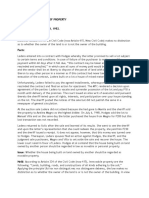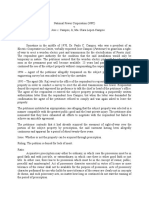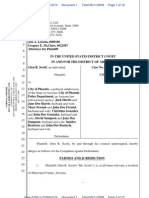OBLICON - 132 - Broadway Centrum V Tropical Hut
OBLICON - 132 - Broadway Centrum V Tropical Hut
Uploaded by
maureen_ablanCopyright:
Available Formats
OBLICON - 132 - Broadway Centrum V Tropical Hut
OBLICON - 132 - Broadway Centrum V Tropical Hut
Uploaded by
maureen_ablanOriginal Title
Copyright
Available Formats
Share this document
Did you find this document useful?
Is this content inappropriate?
Copyright:
Available Formats
OBLICON - 132 - Broadway Centrum V Tropical Hut
OBLICON - 132 - Broadway Centrum V Tropical Hut
Uploaded by
maureen_ablanCopyright:
Available Formats
Broadway Centrum Condominium Corporation v Tropical Hut Food Market, Inc.
and CA July 5, 1993 FACTS: - Broadway and Tropical entered into a contract of lease where Tropical is the lessee 3,042.19 sqm portion of Broadway Centrum Commercial Complex for 10yrs (Feb 1, 1981 Feb 1, 1991). The monthly rental was P120K during the first 3 years, P140K for the next three years and P160K during the last 4 years. -On Feb 1982, Tropical wrote to Broadway that the monthly rental was too high with regards to their gross profit rate and proposed a reduced monthly rental of P50K or 2% their monthly sales, whichever is higher. Broadway denied this request but instead gave them suggestions to boost their sales and reduced their rent conditionally by P20K for four months. If their sales reach a 15% increase, the P80K that was reduced from their rent will be spread over the last six months of the year, but if not, then the P80K will not have to be paid anymore. - Due to the temporary closure of Doa Juana Rodriguez Avenue that was affecting the business of all of Broadways tenants, Broadway agreed to a provisional and temporary agreement on April 1982. This agreement provides that This provisional arrangement should not be interpreted as amendment to the lease contract entered into between us. - After the Doa Juana Rodriguez Avenue was re-opened, Broadway informed Tropical that the agreement can no longer be extended and that the monthly rate will be increased to P100K. -Tropical refused to pay the increased and rent and continually negotiated a P60K or 2% of gross sales whichever is higher monthly rate because of their low sales volume. Broadway continually refused until Tropical took a different stance and stated that Broadway cannot just arbitrarily and unilaterally increase rentals and that they are not in a financial position to agree to such an increase. -Broadway replied that if Tropical continues to refuse heeding their demands, they are formally serving them notice that they will implement par 5 of their lease contract. -Tropical filed a complaint a week later, seeking to prevent Broadway from invoking par 5 of their lease contract and to decree that the rental provided for in the letteragreement in April 1982 should subsist while the low volume sales (of Tropical) still continue ISSUE: W/N the letter-agreement dated Apr 20, 1982 novated the Lease Contract of Nov 20, 1980. HELD/RATIO: No. By definition, novation is the extinguishment of an obligation by the substitution of that obligation with a subsequent one, which terminates it, either by changing its object or principal conditions (objective) or by substituting a now debtor in place of the old one (subjective), or by subrogating a third person to the rights of the creditor. If objective novation is to take place, it is essential that the new obligation
expressly declare that the old obligation to be extinguished, or that now obligation be on every point incompatible with the old one. Novation is never presumed; it must be established either by the discharge of use old debt by the express terms of the new agreement, or by the acts of the parties whose intention to dissolve the old obligation as a consideration of the emergence of the new one must be clearly manifested. The will to novate, whether totally or partially, must appear by express agreement of the parties, by their acts which are too clear and unequivocal to be mistaken. It is clear that the letter-agreement of Apr 1982 did not extinguish or alter the obligations of Tropical and the rights of Broadway under the Lease Contract of Nov 1980. It was expressly stated in the Apr 1982 agreement that it was a provisional agreement should not be interpreted as amendment to the contract entered into by both parties. There is nothing in the text of this agreement that could suggest that the reduced concessional rental rates could not be terminate dby Broadway without the consent of Tropical. Also, the course of negotiation between the two parties before the execution of the letter-agreement clearly indicates that what they were negotiating was supposed to be only temporary. Secondly, the Nov 1980 Lease Contract made it clear that a temporary and provisional concessional reduction of rentals that Broadway might grant was not to be construed as alteration or waiver of any way to the terms of the lease contract itself. The course of discussions between the parties after the execution of the letter agreement shows that there was no agreement that the reduction in rentals is to persist for the rest of the 10-year lease. Finally, the low volume of sales that Tropical was stating as their cause for petitioning a reduction in rental rates was based on feasibility study that Tropical had made on its own before Tropical and Broadway have enetered into their 1980 lease contract. It was no more than an expression of Tropicals own expectations when it entered into the Contract of Lease. DECISION: Petition be given due course. RTC and CA reversed and set aside. Tropical will then pay Broadway as follows: 1) P80K monthly from 1-Jan-1983 to 30-Jun-1983; 2) P100K monthly from 1-Jul-1983 to 31-Jan-1984; 3) P140K monthly from 1-Feb-1984 to 1-Feb-1987; and 4) P160K monthly from 1-Feb-1987 to 31-Jan-1991.
You might also like
- Affidavit of Guardianship With SPADocument2 pagesAffidavit of Guardianship With SPALina Rhea100% (4)
- What Cases Are Covered by The Katarungang Pambarangay LawDocument2 pagesWhat Cases Are Covered by The Katarungang Pambarangay LawSarah Nengasca90% (59)
- SANGGUNIANG PANLUNGSOD NG BAGUIO vs. JADEWELL PARKING (G.R. No. 160025. April 20, 2005)Document3 pagesSANGGUNIANG PANLUNGSOD NG BAGUIO vs. JADEWELL PARKING (G.R. No. 160025. April 20, 2005)Keenan K Mangiwet67% (3)
- G.R. No. 138031Document4 pagesG.R. No. 138031Beverly LegaspiNo ratings yet
- Case Digest For Legal EthicsDocument6 pagesCase Digest For Legal EthicsMary ChrisNo ratings yet
- Chavez v. Public Estates Authority (July 9, 2002)Document1 pageChavez v. Public Estates Authority (July 9, 2002)Arvi RiveraNo ratings yet
- Bambalan V Maramba and MuerongDocument1 pageBambalan V Maramba and MuerongSuiNo ratings yet
- Case Digest 01Document8 pagesCase Digest 01Grecian T. AsoyNo ratings yet
- Legal Prof Bwesit DigestDocument10 pagesLegal Prof Bwesit DigestKarl Rainier BarcenasNo ratings yet
- PNB V SAYODocument2 pagesPNB V SAYOGui PeNo ratings yet
- Romero V EstradaDocument4 pagesRomero V Estrada上原クリスNo ratings yet
- 102) Katz v. USDocument2 pages102) Katz v. USAlexandraSoledadNo ratings yet
- 2) Philippine Bank of Communications vs. Commissioner of Internal Revenue G.R. No. 112024 January 28, 1999 FactsDocument1 page2) Philippine Bank of Communications vs. Commissioner of Internal Revenue G.R. No. 112024 January 28, 1999 FactsBruno GalwatNo ratings yet
- CIR v. Fisher - Foreign LawDocument3 pagesCIR v. Fisher - Foreign LawNiñoMaurinNo ratings yet
- Board of Commissioners (CID) v. Dela RosaDocument86 pagesBoard of Commissioners (CID) v. Dela RosaJcNo ratings yet
- 10 Philsec Investment Corp v. CA G.R. No. 103493Document15 pages10 Philsec Investment Corp v. CA G.R. No. 103493Nikki Estores GonzalesNo ratings yet
- Perido V PeridoDocument1 pagePerido V PeridoKyra Sy-SantosNo ratings yet
- 7.7 NHA v. Manila SeedlingDocument3 pages7.7 NHA v. Manila SeedlingAnna VeluzNo ratings yet
- Teodoro vs. Espino G.R. No. 189248 February 5, 2014 Perez, J. FactsDocument2 pagesTeodoro vs. Espino G.R. No. 189248 February 5, 2014 Perez, J. FactsStephano OliverosNo ratings yet
- PROPDocument172 pagesPROPMark Hiro NakagawaNo ratings yet
- Tumalad V Vicencio G.R. No. L-30173 September 30, 1971: FactsDocument4 pagesTumalad V Vicencio G.R. No. L-30173 September 30, 1971: FactsreginavictorialakiNo ratings yet
- Property-NPC Vs IbrahimDocument1 pageProperty-NPC Vs IbrahimDianaNo ratings yet
- Gempesaw V CADocument4 pagesGempesaw V CATippy Dos SantosNo ratings yet
- People Vs VelosoDocument3 pagesPeople Vs VelosoEvangelyn EgusquizaNo ratings yet
- Wong Woo Yiu Vs VivoDocument1 pageWong Woo Yiu Vs VivoFranzMordenoNo ratings yet
- Dennis v. United States, 384 U.S. 855 (1966)Document19 pagesDennis v. United States, 384 U.S. 855 (1966)Scribd Government DocsNo ratings yet
- Ufemia Mercado V. The Municipal President of Macabebe, Pampanga, and The Secretary of Commerce and CommunicationsDocument1 pageUfemia Mercado V. The Municipal President of Macabebe, Pampanga, and The Secretary of Commerce and CommunicationsArah Mae BonillaNo ratings yet
- The Municipality of Moncada vs. Pio CajuiginDocument1 pageThe Municipality of Moncada vs. Pio CajuiginJiro LeeNo ratings yet
- Inchausti Vs de LeonDocument1 pageInchausti Vs de LeonKenmar NoganNo ratings yet
- Continental Illinois Bank Vs ClementDocument1 pageContinental Illinois Bank Vs ClementNikhim CroneNo ratings yet
- Nenita V Galabo 14Document2 pagesNenita V Galabo 14Mikhel Beltran100% (1)
- People V ReyesDocument4 pagesPeople V Reyesneil peirceNo ratings yet
- Aboitiz Shipping v. New India AssuranceDocument1 pageAboitiz Shipping v. New India AssuranceConie Novela100% (1)
- Property Case Digest - PossessionDocument2 pagesProperty Case Digest - PossessionmonjekatreenaNo ratings yet
- Immutability of JudgementDocument3 pagesImmutability of Judgementj guevarraNo ratings yet
- Gonzalo Villanueva V BranocoDocument10 pagesGonzalo Villanueva V BranocoMark Rainer Yongis LozaresNo ratings yet
- 10 de La Vina Vs VillarealDocument1 page10 de La Vina Vs VillarealDolceNo ratings yet
- Melencio vs. Dy Tiao Lay PDFDocument16 pagesMelencio vs. Dy Tiao Lay PDFAira Mae P. LayloNo ratings yet
- Campos Rueda - Co. v. Pacific Commercial Co. 44 Phil 916 (1923)Document1 pageCampos Rueda - Co. v. Pacific Commercial Co. 44 Phil 916 (1923)FranzMordenoNo ratings yet
- Alarilla V OcampoDocument2 pagesAlarilla V OcampoSophiaFrancescaEspinosaNo ratings yet
- PUP Vs CADocument6 pagesPUP Vs CAArnel MangilimanNo ratings yet
- 6 Quiombing V CADocument3 pages6 Quiombing V CAGabriel CruzNo ratings yet
- California Vs Pioneer Insurance Case Digest - AdrDocument2 pagesCalifornia Vs Pioneer Insurance Case Digest - AdrJuliaNo ratings yet
- Statutory Construction by Agpalo Book 2003Document88 pagesStatutory Construction by Agpalo Book 2003Vir Stella MarianitoNo ratings yet
- Tecson V FaustoDocument2 pagesTecson V FaustoAviLopezNo ratings yet
- In Re Maquera (2004)Document8 pagesIn Re Maquera (2004)happymabeeNo ratings yet
- 15.1 Knights of Rizal v. DMCIDocument8 pages15.1 Knights of Rizal v. DMCIPau SaulNo ratings yet
- Pamplona v. Moreto (MANALASTAS)Document4 pagesPamplona v. Moreto (MANALASTAS)Arnel ManalastasNo ratings yet
- #3 (Abing v. NLRC) and #5 (Philippine Hammonia v. Dumadag)Document2 pages#3 (Abing v. NLRC) and #5 (Philippine Hammonia v. Dumadag)Maan Umpad VirayNo ratings yet
- Property Case Digest 1Document21 pagesProperty Case Digest 1KayeCie RLNo ratings yet
- Ragasa v. Roa (CHUA)Document2 pagesRagasa v. Roa (CHUA)Francis MasiglatNo ratings yet
- Bentir and Pormida V Leanda and Leyte GulfDocument2 pagesBentir and Pormida V Leanda and Leyte GulfBenitez GheroldNo ratings yet
- 003 NPC v. Campos, GR 143643 June 27, 2003Document2 pages003 NPC v. Campos, GR 143643 June 27, 2003IJ SaavedraNo ratings yet
- Colegio Medico v. Limpdf PDFDocument1 pageColegio Medico v. Limpdf PDFnilesrevillaNo ratings yet
- Austria v. CA, 39 SCRA 527 (1971)Document2 pagesAustria v. CA, 39 SCRA 527 (1971)Fides Damasco33% (3)
- Case Digest 3Document36 pagesCase Digest 3Mellie MorcozoNo ratings yet
- People v. DurangoDocument1 pagePeople v. DurangoRon DecinNo ratings yet
- Phil. Women - S Christian Temperance Union v. YangcoDocument4 pagesPhil. Women - S Christian Temperance Union v. YangcoRENGIE GALONo ratings yet
- Broadway Centrum Condominium Corporation v. Tropical Hut, 224 SCRA 302 (1993)Document2 pagesBroadway Centrum Condominium Corporation v. Tropical Hut, 224 SCRA 302 (1993)Ernie GultianoNo ratings yet
- Broadway Vs Tropical Hut DigestDocument2 pagesBroadway Vs Tropical Hut DigestCarl AngeloNo ratings yet
- 86 Broadway Centrum Condominium Corp. v. Tropical Hut - DIGESTDocument2 pages86 Broadway Centrum Condominium Corp. v. Tropical Hut - DIGESTAllen Windel BernabeNo ratings yet
- Case No 4. Broadway V TropicalDocument2 pagesCase No 4. Broadway V TropicalCristy C. BangayanNo ratings yet
- Chapter 2: National Differences in Political, Economic, and Legal Systems 1) Political SystemsDocument5 pagesChapter 2: National Differences in Political, Economic, and Legal Systems 1) Political SystemsBảoNgọcNo ratings yet
- Anti Harassment Policy PDFDocument3 pagesAnti Harassment Policy PDFWendy Manuzon GumabonNo ratings yet
- Transparency in Judicial AppointmentsDocument2 pagesTransparency in Judicial AppointmentsShashiNo ratings yet
- Form of Application For Registration of A Public TrustDocument4 pagesForm of Application For Registration of A Public Trustiqbalshaikh1960100% (1)
- Nature of Muslim MarriageDocument16 pagesNature of Muslim MarriageHarshit khare77% (13)
- Matrilineal Rights and Customary Laws in Khasi & Jaintia TribesDocument10 pagesMatrilineal Rights and Customary Laws in Khasi & Jaintia TribesReynold JamatiaNo ratings yet
- RULE OF LAW & Independence of The Judiciary 14.11.12-2Document28 pagesRULE OF LAW & Independence of The Judiciary 14.11.12-2Afidatul AzwaNo ratings yet
- Chapter 2 - Intention To Create Legal RelationDocument3 pagesChapter 2 - Intention To Create Legal RelationSair100% (1)
- ORDER Correa Petition To Resign Granted June 17 1993Document5 pagesORDER Correa Petition To Resign Granted June 17 1993Neil GillespieNo ratings yet
- Article On Impeachment of Judges in IndiaDocument3 pagesArticle On Impeachment of Judges in IndiashanikaNo ratings yet
- Complaint (Filed Copy)Document12 pagesComplaint (Filed Copy)FreedomOfSpeech100% (3)
- 029.strategic Alliance Devt Corp v. Radstock SecuritiesDocument3 pages029.strategic Alliance Devt Corp v. Radstock SecuritiesJustin MoretoNo ratings yet
- Gabriel v. Secretary of Labor and Employment (2000)Document2 pagesGabriel v. Secretary of Labor and Employment (2000)Ish GuidoteNo ratings yet
- Spec Pro Final ExamDocument19 pagesSpec Pro Final ExamVirgilio Tiongson Jr.No ratings yet
- Case Digest - National Airports Corp vs. TeodoroDocument2 pagesCase Digest - National Airports Corp vs. TeodoroSocrates S Amora100% (1)
- Normative Theory of The Press Explains How Ideal Media Ought To Operate With Specific System of Social ValuesDocument2 pagesNormative Theory of The Press Explains How Ideal Media Ought To Operate With Specific System of Social ValuesZuber HashmiNo ratings yet
- Santos vs. BartolomeDocument2 pagesSantos vs. BartolomestrgrlNo ratings yet
- Multigenerational Model of Family TherapyDocument20 pagesMultigenerational Model of Family TherapyisabellaNo ratings yet
- Armault VS., Balagtas, 97 Phil. 358 (1955) - HI-LITEDocument9 pagesArmault VS., Balagtas, 97 Phil. 358 (1955) - HI-LITEEmil BautistaNo ratings yet
- Own Request Transfer FormatDocument3 pagesOwn Request Transfer FormatRanjiv Kumar Ray100% (2)
- Spouses Antonio and Soledad Consing Vs Court of Appeals and Sugar Producers Cooperative Marketing AsDocument11 pagesSpouses Antonio and Soledad Consing Vs Court of Appeals and Sugar Producers Cooperative Marketing AsYani RamosNo ratings yet
- LBP Vs EscandorDocument5 pagesLBP Vs EscandorSugar Fructose GalactoseNo ratings yet
- CCDW License Citizenship/Immigration Status Affidavit: KSP 131 Rev. 1/11 Page 1 of 2Document2 pagesCCDW License Citizenship/Immigration Status Affidavit: KSP 131 Rev. 1/11 Page 1 of 2alexNo ratings yet
- Evid - PP Vs LaquinonDocument8 pagesEvid - PP Vs LaquinonKarla Marie Tumulak0% (1)
- Philippine Government and Politics Quiz 012018Document1 pagePhilippine Government and Politics Quiz 012018Mello Jane Garcia DedosinNo ratings yet
- DiscoveryDocument9 pagesDiscoveryEriq GardnerNo ratings yet
- Facts:: Benedicto Austria, Petitioner, vs. Jose L. Amante, Respondent 79 Phil. 780Document2 pagesFacts:: Benedicto Austria, Petitioner, vs. Jose L. Amante, Respondent 79 Phil. 780Amor Mei OchoaNo ratings yet

























































































